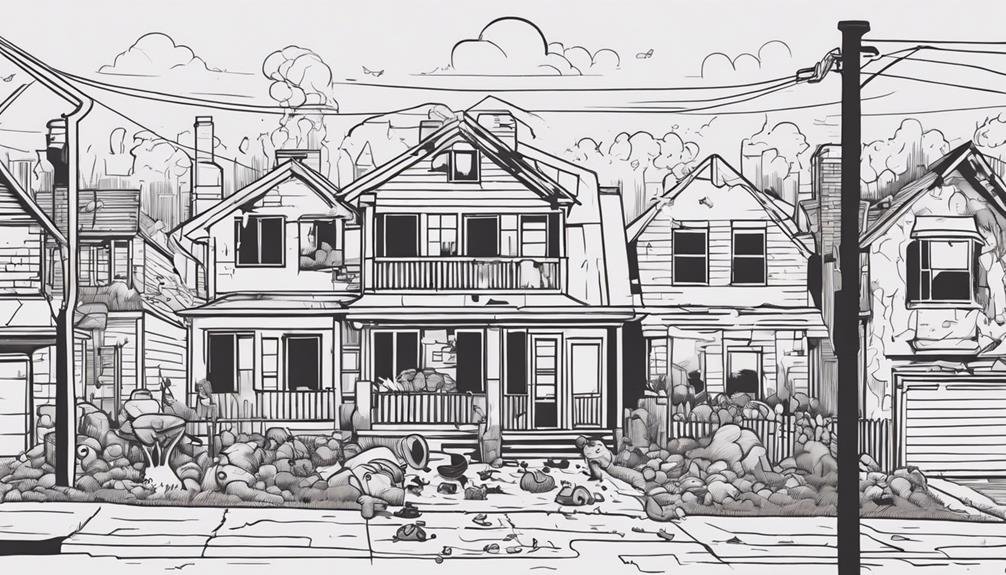You might not realize that your neighbors often overlook crucial warning signs before a disaster strikes.
From foul odors lingering in the air to slow-draining fixtures, these subtle hints can indicate trouble brewing beneath the surface.
Have you ever noticed lush green grass above a septic tank or heard gurgling sounds in your plumbing?
Pay attention to the soggy ground surrounding the drainfield. These signs could save you from a potential catastrophe.
Key Takeaways
- Slow Draining Fixtures can indicate underlying plumbing issues.
- Gurgling Sounds in Plumbing signal potential blockages or ventilation problems.
- Soggy Ground Around Drainfield may point to septic system drainage issues.
- Lush Green Grass Above Tank could suggest septic tank leaks or overflows.
Foul Odors Inside and Outside

If you notice persistent foul odors both inside and outside your home, it could be a sign of underlying issues that need immediate attention. Mold growth and pest infestation are common causes of such unpleasant smells. Mold thrives in damp and humid environments, often hidden from plain sight. It not only produces musty odors but can also pose health risks, especially to those with respiratory conditions. Inspecting areas prone to moisture, like basements and bathrooms, can help identify mold growth early on.
Pest infestation, on the other hand, can lead to foul odors due to their droppings, urine, or decaying bodies. Rodents, insects, or other pests can quickly multiply if not addressed promptly. To tackle pest-related odors, locating and eliminating the source of the infestation is crucial. Sealing entry points, keeping food tightly sealed, and maintaining cleanliness can help prevent pests from taking over your space. If foul odors persist, it's wise to investigate further to avoid potential hazards and ensure a healthy living environment.
Slow Draining Fixtures
Experiencing slow draining fixtures in your home can indicate underlying plumbing issues that require prompt attention to prevent further problems. Slow drainage may seem like a minor inconvenience, but it could be a sign of more significant plumbing maintenance needed. Here are some key points to consider:
- Clogs: Slow draining fixtures often result from clogs within the pipes. Hair, soap scum, and other debris can accumulate over time, obstructing the flow of water and causing drainage issues.
- Sewer Line Problems: If multiple fixtures in your home are draining slowly, it could indicate a problem with the main sewer line. Tree roots, debris, or even a collapsed pipe could be causing the issue, requiring professional intervention to resolve.
- Venting Issues: Poor ventilation in your plumbing system can also lead to slow drainage. A lack of proper venting can create air pressure imbalances, impeding the smooth flow of water through the pipes.
Addressing slow draining fixtures promptly can help prevent more significant plumbing problems down the line. Regular maintenance and timely repairs are crucial to ensuring your plumbing system functions properly.
Lush Green Grass Above Tank

The presence of lush green grass above a tank can indicate potential underground issues that require attention. When your tank is buried underground, vibrant grass above it may indicate a leak or overflow. To prevent further damage, conduct a thorough tank inspection. Look for any signs of moisture around the tank area or a sudden increase in your water bill, which could suggest a leak. Regular tank inspection is crucial to catch any issues early on.
To maintain your tank and prevent future problems, consider these maintenance tips. Firstly, ensure that the tank lid is properly sealed to prevent leaks. Secondly, check the tank's structural integrity periodically for any cracks or damage. Thirdly, avoid planting deep-rooted plants above the tank to prevent root intrusion. Lastly, schedule regular professional inspections to catch any potential problems early.
Gurgling Sounds in Plumbing
You may notice gurgling sounds coming from your plumbing system, indicating potential issues that require prompt attention. These sounds can signal underlying problems that, if left unaddressed, may lead to significant damage. To prevent further issues, consider the following:
- Check for Clogs: Gurgling noises often result from blockages in your pipes. Hair, grease, or other debris may be obstructing the flow of water, causing air bubbles to make these sounds.
- Inspect Ventilation Systems: Improper ventilation can also lead to gurgling sounds. Ensure that your plumbing vents are clear of any obstructions to allow proper air circulation.
- Schedule a Professional Inspection: If gurgling sounds persist, it's advisable to seek a professional inspection. A plumber can conduct a thorough assessment to identify the root cause of the noise and recommend necessary repairs.
Preventive maintenance and regular professional inspections can help address plumbing issues before they escalate, saving you time and money in the long run.
Soggy Ground Around Drainfield

If the ground around your drainfield feels consistently soggy, it may indicate potential drainage issues that require immediate attention. Waterlogged soil around the drainfield can be a sign of underlying problems that need to be addressed promptly. Proper drainfield maintenance is crucial to ensure the efficient functioning of your septic system and prevent costly repairs down the line.
Waterlogged soil around the drainfield can result from various factors such as a clogged or overflowing septic tank, a damaged drainfield pipe, or poor drainage in the surrounding area. If left unchecked, these issues can lead to sewage backup, foul odors, and even groundwater contamination.
To address soggy ground around your drainfield, consider contacting a professional septic system service provider to inspect the system, identify the root cause of the problem, and recommend necessary repairs. Additionally, regular drainfield maintenance, such as pumping the septic tank as needed and avoiding planting trees or shrubs near the drainfield, can help prevent waterlogging issues in the future. Remember, proactive maintenance is key to keeping your septic system in good working condition and avoiding potential disasters.
Conclusion
In conclusion, it's important to pay attention to the warning signs that your neighbors may have missed before disaster struck.
By being vigilant and noticing foul odors, slow draining fixtures, lush green grass above tanks, gurgling sounds in plumbing, and soggy ground around drainfields, you can prevent potential issues before they become major problems.
Remember, a stitch in time saves nine when it comes to septic system maintenance. Stay alert and protect your home from unexpected disasters.

